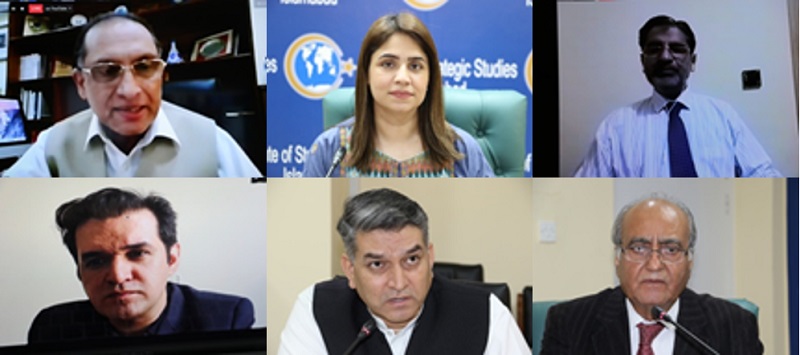PRESS RELEASE
Panel Discussion
China-Iran Deal: Prospects for Pakistan
June 10, 2021

The Centre for Afghanistan, Middle East & Africa (CAMEA) at the Institute of Strategic Studies Islamabad (ISSI) had a Panel Discussion on ‘China-Iran Deal: Prospects for Pakistan’. The distinguished speakers included: Dr Syed Qandil Abbas, Assistant Professor, School of Politics and International Relations, QAU; Dr Ali Ahmadi, scholar and analyst of economic statecraft and US foreign policy in the Middle East based in Tehran and Dr Talat Shabbir, Director China-Pakistan Study Center (CPSC) at ISSI.
Ambassador Aizaz Ahmad Chaudhry, Director General, ISSI and Ambassador Khalid Mahmood, Chairman ISSI also took part in the discussion.
During her opening remarks, Ms. Amina Khan, Director CAMEA, said that the conclusion of this agreement is a major milestone in China-Iran bilateral relationship. It comes at a particularly difficult strategic moment for both countries as they navigate tensions with the United States. Iranian leadership has termed China as a ‘friend of difficult days’, and now when Iran is struggling to respond to economic pressures in the face of continued US sanctions, China’s decision to up-grade the relationship presents an economic lifeline.She said that it is needless to say, the latest expansion of the multi-billion-dollar Belt and Road Initiative (BRI) will give relief to a downtrodden Iranian economy while providing China with a strong foothold in the Middle East. She concluded by saying that while the whole world closely follows progress in expanding China-Iran ties, no one is more eager than neighbour to both Iran and China — Pakistan which has direct political, economic and security interests, and will also be the country benefitting most from expanding cooperation in its immediate neighbourhood.
Ambassador Chaudhry said that very little is known about this deal. He said that, strategically speaking, it appears as a natural partnership between Pakistan and China based on their shared relations with the United States and their prospectives of collaboration in energy and investment exchanges. While talking about the impacts of the deal on Pakistan he mentioned that instability in Afghanistan will also affect the deal. Given the requirements of China- Pakistan Economic Corridor (CPEC) it is important to focus on the Balochistan province which will help give impetus to business activities that will ensue.
Dr Syed Qandil Abbas called the China-Iran deal a major milestone. He outlined how China is increasing its foothold in the Middle East both economically and diplomatically. He mentioned that trade with the Middle East has increased from $227 to $297 billion. In this backdrop, this deal can be considered as a bailout package for Iran. Moreover, it will support the Iranian economy and it will also help lessen the effects of US sanctions.While highlighting the impacts of the deal on Pakistan he pointed out that trilateral partnership can enhance the chances of cooperation in the region and this will ultimately challenge Indian hegemony in the region. He was of the view that Chinese engagement will bring prosperity to the region and help in conflict resolution.
While talking about Pakistan he said that, at this stage, the Pakistan-Iran gas pipeline is an important issue for Pakistan. Pakistan may be able to mature its gas pipeline with Iran after the deal is materialised. He mentioned that this deal will create prospects of border management between Iran and Pakistan.
While talking about Afghanistan he stated that the Afghanistan issue should be resolved at a regional level.China has established good relations and economic ties with Afghanistan. This trilateral cooperation will help to bring peace in Afghanistan.
Dr Ali Ahmadi said that Iran is pushed into a corner by American pressure which has led Iran to find common ground with China. Two countries must prioritise the relationship for its full potential to be realized.GCC countries are aligned with the US so Iran is more of a natural partner of China. While talking about India he mentioned that Chabahr port will be an issue for India, because this deal will ultimately undermine India’s influence as many investments which were promised from the Indian side have not yet materialized.Talking about the security aspect he was of the view thatChina seems disinclined to get involved in the security frameworks of other regions. For example, in Yemen, they were invited to play a role but China deferred. China may become a facilitator for economic cooperation between Iran and Saudi Arabia.The military presence of China in Iran is not acceptable to the people of Iran but that doesn’t rule out military cooperation, he stated.
Dr Talat Shabbir said that the China-Iran Deal is a significant development in the region. It has both economic and security components. Three major aspects of the deal in the US viewpoint are that first, this deal is between two adversaries and it will have security implication in times to come. Secondly, US and China are trying to increase their sphere of influence in the region. Thirdly China is helping Iran to come out of the economic situation which the US itself has created. While talking about Gawadar and Chabbhar, he said that both ports are sister ports and will complement each other. He said that China can develop Chabahar as an important commercial port and that this deal will undermine India’s role in the region. He said that the road to China replacing US influence in the region will be a gradual one and China will have to face complications in this regard.
Ambassador Khalid Mahmood cautioned against over-enthusiasm regarding the deal. He viewed it as a comprehensive road map for the future and believed that it would enable better Iran- Pakistan ties by upseating Indian influence. Ambassador Khalid said that he did not expect China to play a proactive role in regional politics but keep it limited to the economic cooperation.











